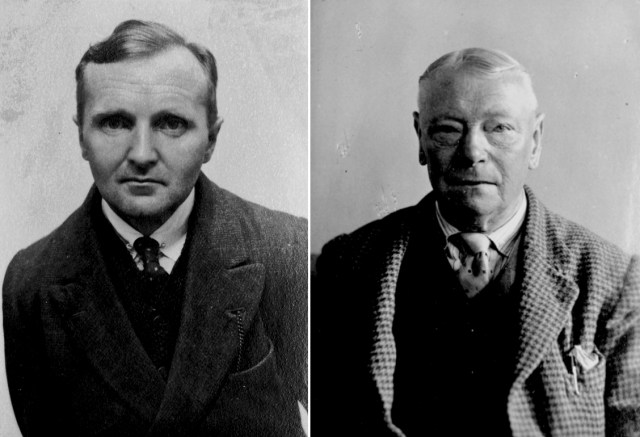Royal Marines march through Ostend in August 1914.
Why the marines were there you’ll have to look up elsewhere, but could one of these three gentlemen have been among them?
I don’t know, of course I don’t, because apart from their names, which I shall keep to myself, as usual, and the fact that they were marines, I know nothing whatsoever about any of them, but it’s possible.
And it is even more possible that one of these men was there. The man on the left was a pre-war marine, enlisting in 1913 and serving for six years before he was invalided home with multiple arthritis in 1919, having been treated for a ‘displaced cartilege (sic) in left knee’ in October 1918*. The man on the right amassed a total of almost twenty six years service on his discharge in March 1919, although not all with the Royal Marines. Born in 1863, he had served in the regular army as far back as the 1880s, because he was awarded the Egyptian Medal & the Khedive’s Star dated 1887, at which time, I gather, operations were taking place mainly near Suakin and along the River Nile. Now if you add twenty six years to 1887 you get to 1913, and as we know, he served until 1919, so he must have finished his time with the army at some point in the 1910s, and then re-enlisted in the Marines, presumably on the outbreak of war in 1914. The photograph was taken in February 1939, on his admission to hospital, only six months before his death on 10th September, one week into a new world war.
*me too, right knee, December 1998.
The man on the left was once an able seaman in the Royal Naval Division (formed at the outbreak of the war from Royal Navy & Royal Marine reservists who were not needed for service at sea), and the man on the right was a private with the Royal Defence Corps, although ex-Royal Marine Artillery.
These are the men who came home. Remember them.






The older man would have been 53 at the outbreak of WW1. A real old trooper I am surprised.the Royal Marines took him on. I hope he only served on Home Service he had a lot of experience to pass on.
Thanks as always
Good point Alan.
Now then my husband’s uncle Adam Sutherland was transferred from Seaforth regiment to Royal Marines and took part in raid on Zeebrugge. He returned home and resumed life as village postman. Only once he died early 1970s did information come to light about his service . That I think was typical of many of them
I have no doubt you are correct.